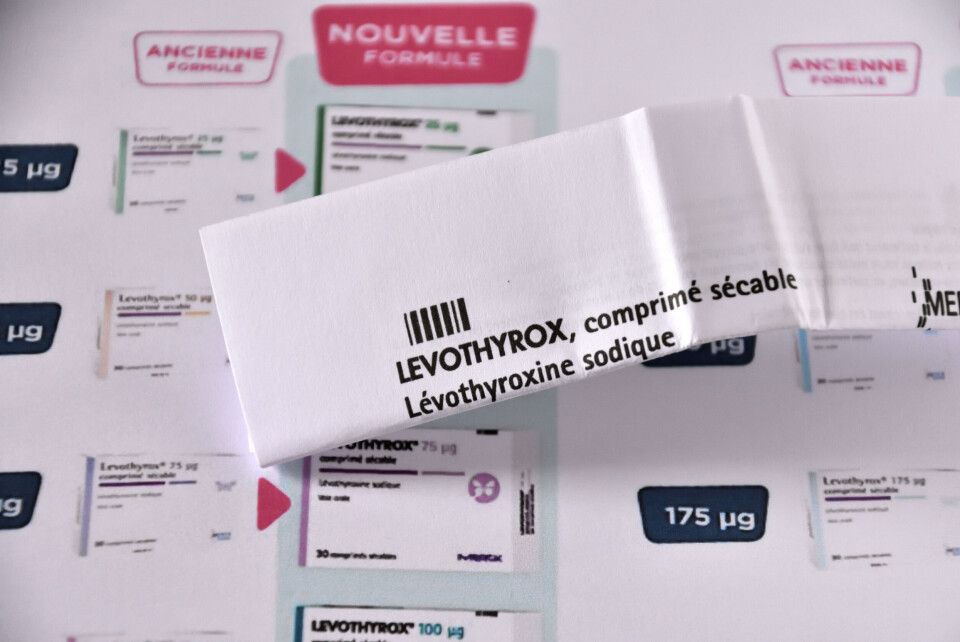-
French ski resorts report excellent Christmas despite less snow than last year
Bookings are up and non-snow related activities are also on the rise
-
Farmer protests in France: Blockades in place on several major roads
Tractor convoys head for Paris ahead of a major protest planned for Thursday
-
Readers share their photos of snowy France
Wintry images from Vendée to Champagne
French high court orders Merck to pay €3.3m to Levothyrox victims
The court found that the lab had committed ‘a fault’ in the final ruling on a case that dates back to 2017

Medical lab Merck has been officially ordered to compensate more than 3,300 people suffering from thyroid problems in France after it changed the formula of its drug Levothyrox.
The order from the highest French court, la Cour de cassation, comes almost two years after the lab was first ordered to pay €1,000 to each of the 3,300 plaintiffs in the case by the court of appeal in Lyon.
The Cour de cassation is France’s highest court in the judicial system and the last resort when appealing a case.
Read more: Levothyrox controversy: Lyon court wins payout for patients
#Levothyrox la cour d’appel de #lyon reconnaît la faute de @merck et la condamne à payer 1000€ de dommages et intérêts pour chaque demandeur @MySMARTcab pic.twitter.com/Gmgh58IJl3
— Christophe LEGUEVAQUES (@CLeguevaques31) June 25, 2020
In the new ruling, the court confirmed that "when the composition of a medicine changes and this change in formula is not explicitly indicated in the package leaflet, the manufacturer and the operator may be reproached for a lack of information", which may "cause damage” to a person’s quality of life.
The court threw out Merck’s appeal of the 2020 ruling, and said that the lab had committed a “fault”, said one of the plaintiffs’ lawyers, Mr Christophe Lèguevaques. The court ordered Merck to finally pay €1,000 to each plaintiff for damage to a person’s quality of life.
This equates to a total of €3.3million. However, this is far less than the €10,000 per person demanded by the plaintiffs’ lawyers.
Case dating back to 2017
The drug first caused controversy in 2017, after users – many of whom rely on it for their health and quality of life – reported that a change in the formula meant the medication was no longer working for them, and they were suffering severe side effects.
Merck denied that it had made any significant changes to the drug, and had only made very slight changes to non-active ingredients under routine requirements from French medical authority ANSM. It claimed that the new formula was “bioequivalent” to the old, and would work in the same way as before.
Independent tests by the ANSM found that the new drug was of “good quality”, but other tests suggested that there had been significant changes to the formula.
Read more:New France-UK study finds Levothyrox 'not equivalent'
Many users reported a return of symptoms such as dizziness, headaches, memory loss, extreme fatigue, hair loss, digestive problems, muscle cramps, and depression, and even thyroid cancer, and traced the changes back to the new formula.
A charge of manslaughter was even attached to the case after a woman died, allegedly from complications linked to the new Levothryox formula.
Then-Health Minister Agnès Buzyn made the old formula available immediately after the furore, and half of the 130,000 boxes sold out nationwide within two days.
The original court in Lyon was forced to open in a concert hall in Lyon to accommodate the 4,113 plaintiffs, but it later dismissed the case. This was then appealed.
Related articles
French agency confirms ‘good quality’ of Levothyrox
Lyon court dismisses controversial Levothyrox case
Old Levothyrox formula available in France until end of 2021
























